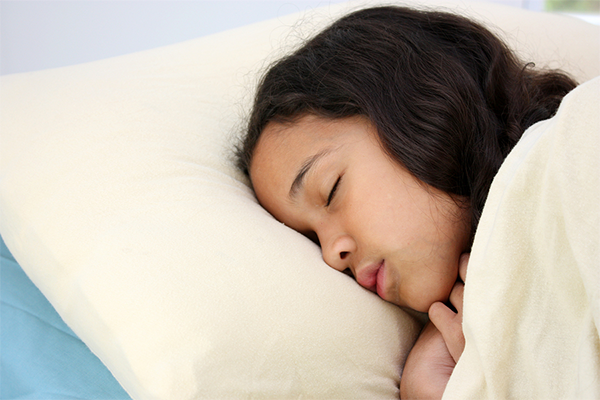The National Sleep Foundation celebrated Sleep Awareness Week© March 6-13. Making sure your child gets the proper amount of sleep from infancy through the teenage years is an important part of ensuring development and growth.
Parents frequently ask how long their child should be sleeping.
It is very important for your child to get the recommended amount of sleep. It is also important to establish a bedtime routine that includes a set bedtime and a set wake time. These are some easy-to-follow guidelines that will make bedtime a more pleasant experience:
- A good routine should ideally begin about 30 minutes prior to the actual bedtime.
- Engage in something easy and relaxing such as stretching or reading.
- All electronic device use should be stopped 30 minutes prior to bedtime.
Infants’ brains spend a majority of time in sleep mode. Children must develop what is called circadian rhythm or a sleep-wake cycle. This is regulated by light and darkness and typically begins to develop in infants around the age of 6 weeks. This is what enables the child to have a regular sleep-wake schedule later on.
The National Sleep Foundation makes the following recommendations for amounts of sleep that children should receive according to age:
NEWBORNS AND INFANTS
- Newborns age 0-3 months……………..………..….14-17 hrs.
- Infants age 4-11 months……………….……………12-15 hrs.
Sleep Tips for Newborns
- Observe baby’s sleep patterns and identify signs of sleepiness.
- Put baby in the crib when drowsy, not asleep.
- Place baby to sleep on his/her back with face and head clear of blankets and other soft items.
- Encourage nighttime sleep.
Sleep Tips for Infants
- Develop regular daytime and bedtime schedules.
- Create a consistent and enjoyable bedtime routine.
- Establish a regular “sleep friendly” environment.
- Encourage baby to fall asleep independently
TODDLERS
Toddlers age 1-2 years………………………………………11-14 hrs.
Sleep Tips for Toddlers:
- Maintain a daily sleep schedule and consistent bedtime routine.
- Make the bedroom environment the same every night and throughout the night.
- Set limits that are consistent, communicated and enforced. Encourage use of a security object such as a blanket or stuffed animal.
- Maintain a regular and consistent sleep schedule.
- Have a relaxing bedtime routine that ends in the room where the child sleeps.
- The child should sleep in the same sleeping environment every night, in a room that is cool, quiet and dark – and without a TV.
PRESCHOOLERS AND SCHOOL-AGED CHILDREN
- Preschoolers age 3-5 years……………..……………10-13 hrs.
- School-aged children 6-13 years…………………….. 9-11 hrs.
Sleep Tips for School-aged Children
- Teach school-aged children about healthy sleep habits.
- Continue to emphasize need for regular and consistent sleep schedule and bedtime routine.
- Make child’s bedroom conducive to sleep – dark, cool and quiet.
- Keep TV and computers out of the bedroom.
- Avoid caffeine.
NOTE: It is not uncommon for preschoolers to have nightmares or to sleepwalk, which can interfere with sleep. Poor or inadequate sleep in school-aged children can lead to mood swings, behavioral and cognitive problems that impact their ability to learn in school.
TEENAGERS
Teenagers age 14-17 years……………………………….……8-10 hrs.
Sleep Tips for Teenagers
- Encourage regular exercise.
- Reduce caffeine.
- Provide your teenager with a comfortable bed.
Many teens naturally shift their sleep tendency toward staying up later at night and waking up later in the morning. Some teens may suffer from sleep disorders, such as narcolepsy insomnia, restless legs syndrome or sleep apnea. The effects of your teen not getting enough sleep may include;
- Decreased ability to learn, listen, concentrate and solve problems
- Decreased memory
- More prone to pimples
- Increased aggression
- Falling asleep while driving
The Pediatrics Augusta University Sleep Center at CHOG helps pediatric patients who suffer with insomnia, excessive daytime sleepiness, teeth grinding, sleepwalking, snoring, bedwetting or other childhood sleep disorders.
Don’t let sleep problems undermine your child’s life, call 706-721-KIDS (5437) or check out our website at augustahealth.org/chog.
Source: National Sleep Foundation




